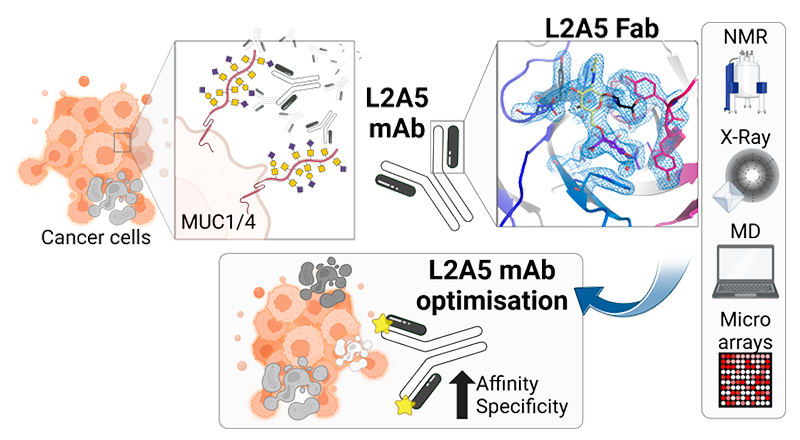
2024/12/19
New perspectives on the role of the Sialyl-Tn (sTn) glycan in cancer immunology
A new study, in collaboration with various international institutions, explores the role of glycans in cancer, focusing on the sTn marker, present in several types of tumors.
These findings, published in the JACS Au journal, open new possibilities for improving early detection and personalized cancer treatment, with the potential to reduce side effects and develop less invasive therapies.
This study highlights the importance of collaboration and multidisciplinary research to tackle complex challenges and optimize outcomes for patients.
Glycans, molecules found on the surface of cells, play a critical role in various biological functions, including immune responses and cancer development. A new study, led by Dr. June Ereño-Orbea, Ikerbasque researcher, and Group Leader of the Cancer Glycoimmunology Lab at CIC bioGUNE, member of BRTA, in collaboration with the Chemical Glycobiology Lab and with researchers from NOVA School of Science and Technology (NOVA University Lisbon), has investigated the role of glycans in cancer, focusing on a specific glycan marker, sialyl-Tn (sTn), which is commonly found in several cancers, including breast, colon, and bladder cancer.
Published in the prestigious JACS Au journal, this investigation provides a deeper understanding of how the L2A5 antibody, developed by the NOVA research team, binds to sTn on tumor cells, offering important insights into cancer biology.
The work focuses on the structure and molecular recognition features of the L2A5 antibody, which specifically targets the sTn glycan, a biomarker on the surface of tumor cells. Using the synergy of the combination of X-ray crystallography and nuclear magnetic resonance (NMR) spectroscopy, the team has gained detailed insights into these interactions. This knowledge opens the door to unravel the mechanism of how this glycan behaves in cancer cells and how it interacts with the immune system.
This study holds the potential to significantly improve the way we diagnose and treat the disease in the future. By identifying specific markers, such as sTn glycan found on tumor cells, researchers can develop more effective tools for early cancer detection. This breakthrough could lead to personalized and precise treatments, reducing side effects compared to traditional therapies. Moreover, the findings could drive further cancer research and contribute to the development of treatments that are not only more effective but also less invasive.
The collaboration between CIC bioGUNE and NOVA University Lisbon, alongside other renowned institutions such as the University of La Rioja, Umeå University, and Imperial College London, with the funding of the GLYCOTWINNING European Project, highlights the importance of multidisciplinary research. This collaboration brings together experts from various fields, showcasing the power of international cooperation in addressing complex scientific challenges.
Reference: Cátia O. Soares, Maria Elena Laugieri, Ana Sofia Grosso, Mariangela Natale, Helena Coelho, Sandra Behren, Jin Yu, Hui Cai, Antonio Franconetti, Iker Oyenarte, Maria Magnasco, Ana Gimeno, Nuno Ramos, Wengang Chai, Francisco Corzana, Ulrika Westerlind, Jesús Jiménez-Barbero, Angelina S. Palma, Paula A. Videira,* June Ereño-Orbea,* Filipa Marcelo*. Decoding the Molecular Basis of the Specificity of an Anti-sTn Antibody. JACS Au. DOI: 10.1021/jacsau.4c00921.
About CIC bioGUNE
The Centre for Cooperative Research in Biosciences (CIC bioGUNE), member of the Basque Research & Technology Alliance (BRTA), located in the Bizkaia Technology Park, is a biomedical research organisation conducting cutting-edge research at the interface between structural, molecular and cell biology, with a particular focus on generating knowledge on the molecular bases of disease, for use in the development of new diagnostic methods and advanced therapies.
About Ikerbasque
Ikerbasque - Basque Foundation for Science - is the result of an initiative of the Department of Education of the Basque Government that aims to reinforce the commitment to scientific research by attracting, recovering and consolidating excellent researchers from all over the world. Currently, it is a consolidated organization that has 290 researchers/s, who develop their work in all fields of knowledge.
About BRTA
BRTA is an alliance of 4 collaborative research centres (CIC bioGUNE, CIC nanoGUNE, CIC biomaGUNE y CIC energiGUNE) and 13 technology centres (Azterlan, Azti, Ceit, Cidetec, Gaiker, Ideko, Ikerlan, Leartiker, Lortek, Neiker, Tecnalia, Tekniker y Vicomtech) with the main objective of developing advanced technological solutions for the Basque corporate fabric.
With the support of the Basque Government, the SPRI Group and the Provincial Councils of the three territories, the alliance seeks to promote collaboration between the research centres, strengthen the conditions to generate and transfer knowledge to companies, contributing to their competitiveness and outspreading the Basque scientific-technological capacity abroad.
BRTA has a workforce of 3,500 professionals, executes 22% of the Basque Country's R&D investment, registers an annual turnover of more than 300 million euros and generates 100 European and international patents per year.
See a large version of the first picture





